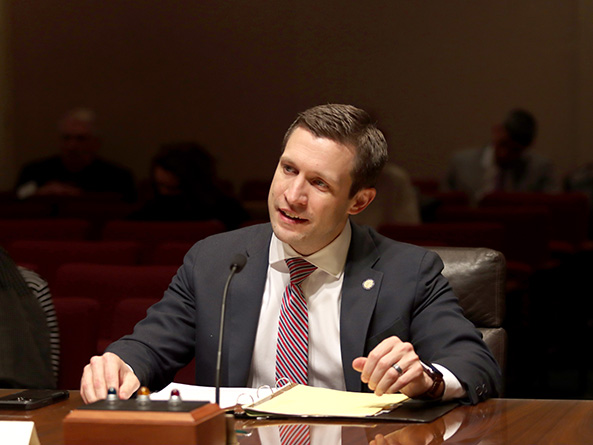State would fund free contraceptives
The Health and Human Services Committee considered a bill Feb. 24 that would provide state-funded, free contraceptives to women upon request.

Under LB1129, introduced by Lincoln Sen. Adam Morfeld, the state would provide free contraceptives approved by the federal Food and Drug Administration to any woman who requests them. Contraceptives would be distributed through Title X and family planning clinics, public health clinics, hospitals, pharmacies and other distribution points.
The bill’s cost would be covered through General Fund appropriations.
Morfeld said many women struggle to afford contraception, even those who have private health insurance, and often pay up to 60 percent of the cost out of pocket. The resulting lack of access to contraception is a significant factor in unintended pregnancies, he said, which in turn is a major cause of abortions.
A 2019 Nebraska study found that “no contraception used” was the most common reason given for seeking an abortion, he said.
“Even though most people use some form of contraception in their reproductive lifetime, barriers still exist that prevent people from obtaining contraception,” Morfeld said. “This bill will help support uninterrupted access to birth control to prevent unintended pregnancy — ultimately reducing abortion.”
Jo Giles, executive director of the Women’s Fund of Omaha, testified in support of the bill. Approximately 21,000 Nebraska women live in an area that lacks a full range of reproductive health care, she said.
Medicaid pays for more than 30 percent of births in Nebraska, Giles said, at a cost of roughly $4,700 per birth, while a prescription for oral contraceptives costs less than $40 a month.
“The state could pay for 10 years of birth control through Medicaid and it would still be cheaper than one unintended pregnancy,” she said.
Julia Keown, representing the Nebraska Nurses Association, also testified in support. She said contraceptives are prescribed for myriad reasons in addition to birth control, including as treatment for migraines, acne, menstrual cramps and endometriosis. Yet women in Nebraska have limited access to contraceptives to optimize their health, she said.
David Zebolsky of Nebraskans Embracing Life testified in opposition, saying oral contraceptives have severe negative impacts on women’s health.
“The harm — the damage to a woman’s body — can be extensive and it can be permanent, and it can be lethal,” he said.
The committee took no immediate action on the bill.


